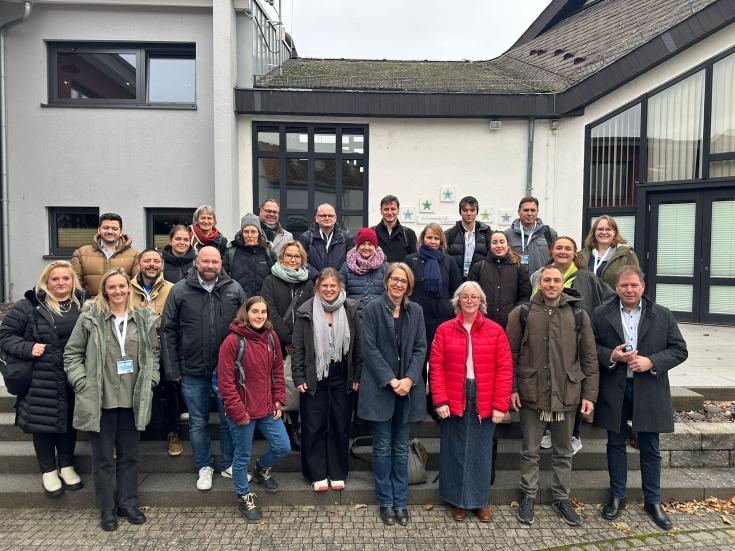Smart solutions for rural challenges: Wetzlar’s meeting 2024
Thanks to the hospitality of the Institute for Rural Development Research (IfLS) and LEADER- Region Lahn-Dill-Wetzlar an engaging and productive meeting took place in Wetzlar, Germany on 10-11 December 2024. It brought together partners and stakeholders across Europe to exchange knowledge, explore best practices, and generate innovative ideas for building smarter, more sustainable rural communities. Over two days of collaborative workshops and on-site study visits, participants gained practical insights into the digitalization of public services, community-driven cooperation, sustainable tourism, and rural innovations.
INSPIRE partners explored five exemplary initiatives in the heart of Hesse, engaging with voluntary associations, civil servants, educators, environmental experts, and private citizens. Each initiative offered creative, practical solutions to rural challenges:
- Fire station and fire brigade as a community hub
Three voluntary fire brigades, critical for rural safety, have been transformed into one community hub through a collaborative co-design process involving three municipalities, local stakeholders and volunteers. By integrating jointly developed children's and youth spaces, great importance is attached to working with the younger generation to attract future volunteers. Other rooms foster local cooperation and promote remote working opportunities. - Tourism revitalization through caves at Autumn Labyrinth – Showcave Breitscheid
Leveraging natural assets such as caves, this initiative promotes slow and sustainable tourism while balancing economic growth, environmental preservation, and digital innovation. The digitalized visitor experience such as 3D photographs and a film of non-accessible cave sections, highlights how technology can enhance cultural heritage and accessibility while stimulating the local economy. - Hüttenberg digital townhall
This initiative demonstrates how digital tools can streamline administrative processes, improve citizen access to services, and reduce bureaucracy, serving as a model for rural areas embracing modern technology for efficient governance. - Weidenhof coworking space
A revitalized traditional farm serves as the foundation for a planned coworking hub, fostering rural innovation and community connections. A successful pop-up coworking event has laid the groundwork for developing multifunctional spaces to support rural businesses and residents. - Bus driving simulator at Werner-von-Siemens school
Combining education and technology, this innovative simulator addresses workforce shortages in the transportation sector while engaging and inspiring youth. It highlights how rural areas can tackle workforce challenges through practical, hands-on solutions.
While context-specific, these initiatives provided valuable inspiration for partners to adapt and implement similar policy solutions in their own regions and to share project ideas.
The study visit culminated in a collaborative workshop at Hüttenberg Townhall, offering participants a deeper understanding of Hesse’s smart rural development strategies. Highlights included:
- A presentation by the German Competence Centre for Rural Development, emphasizing the role of research in driving rural digital innovation.
- Insights from the Hessian State on pioneering digital strategies for rural communities.
- Contributions from Consorzio Poliedra and the IfLS showcased how research can bridge the gap between theory and practical implementation to advance local development.
The workshop fostered knowledge exchange and collaboration, allowing participants to share updates, challenges, and progress. Discussions focused on different topics such as policy improvements and smart rural development; tailored digital solutions to face the digital divide; how to engage youth, strengthen partnerships, and support local micro-businesses and how to identify best practices, such as we already encountered in Hesse. Among those topics, several cross-cutting themes emerged notably the critical role of financing and credits, often a key barrier to initiating smart development in rural areas. Partners also stressed the importance of experience-sharing and collaboration to drive local innovation.
Future discussions will build on German best practices and deepen cooperation with the Advisory Partner and fellow project partners to provide continued guidance and support. The meeting concluded with the agreement on the next stop for the INSPIRE project which will be hosted in Cantabria, Spain, in May 2025.

